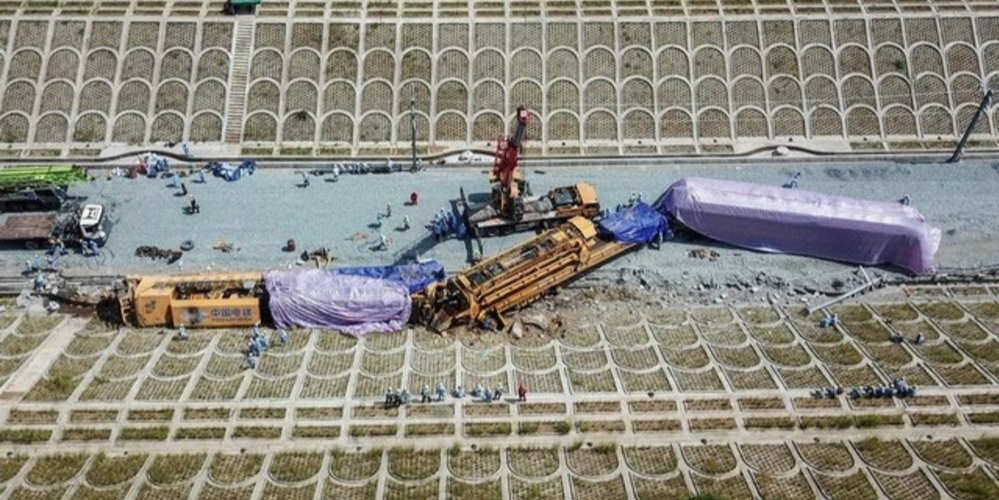BANDUNG, INDONESIA — A train along the Jakarta-Bandung High-Speed Rail (KCJB) derailed on Sunday (18 December) at around 5 pm in Cempaka Mekar Village, Padalarang, West Bandung Regency, leaving two Chinese workers dead and four injured.
It is said in the local news that the trains were thrown 200 metres from the end of the tracks.
The President Director of PT Kereta Cepat Indonesia China (KCIC) Dwiyana Slamet Riyadi, in an official statement on the accident, said that the train that derailed was a work train and not a high-speed train, which consisted of a diesel locomotive and a rail installation machine.
Riyadi said that the rail installation work at the location will be put on hold under the direction of the Ministry of Transportation (Kemenhub) until the completion of an evaluation and investigation of the accident.
He said that KCIC, together with related parties, will evaluate the Standard Operation Procedures (SOP) for rail installation, and other work SOPs. In addition, he will ensure that all workers fulfil safety aspects in every work activity.
“PT KCIC and KCJB contactor fully support the investigation conducted by the authorities,” he said, as quoted from KCIC’s video statement on Monday.
The evacuation process has been carried out since late Sunday using a number of heavy equipment and trucks.
“Now we are evacuating because the equipment is heavy, so everything is stripped down and dismantled,” said the Director of Railway Safety of the Ministry of Transportation, Edi Nursalam, when met at the location with local reporters.
Nursalam said that the accident was suspected to be due to negligence in carrying out occupational health and safety (K3) in the implementation of the project.
“There could be negligence. However, we are still investigating, we don’t know who is at fault, whether it’s the equipment or the person, we still don’t know yet,” he said, adding that the Ministry of Transport cannot speculate further to confirm the cause.
KCJB is built along 142.3 kilometres and passes through four stations, namely Halim, Karawang, Padalarang, and Tegalluar.
Groundbreaking for the project started in 2016, a year after China offered Indonesia a US$50 billion loan package.
The KCJB project uses CR400AF, the latest generation of high-speed trains equipped with disaster-monitoring features with a lower maintenance cost.
Despite some controversies surrounding the project, ranging from a swollen budget that forced the government to use the state budget to fund the construction to the delay in the construction of Tunnel 2 due to unstable soil conditions, which is vulnerable to landslides, the fast railway project shows just how important China is to Indonesia in regard to infrastructure investments.
“We have to admit that Indonesia needs cooperation with China as the former’s effort to build infrastructure as highlighted in President Jokowi’s working program,” an international relations expert and lecturer at Budi Luhur University Yusran in an interview with TOC in mid-November.
On 16 November, Indonesian President Joko” Jokowi” Widodo and his Chinese counterpart Xi Jinping oversaw a dynamic virtual test of the Jakarta-Bandung high-speed railway project from Bali, coinciding with the G-20 summit on the island.
The Jakarta-Bandung bullet train is expected to operate officially in the middle of 2023.






